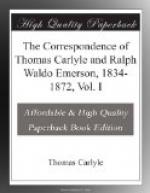You tell me you are but “a reporter”: I like you for thinking so. And you will never know that it is not true, till you have tried. Meanwhile, far be it from me to urge you to a trial before your time come. Ah, it will come, and soon enough; much better, perhaps, if it never came!—A man has “such a baptism to be baptized withal,” no easy baptism; and is “straitened till it be accomplished.” As for me I honor peace before all things; the silence of a great soul is to me greater than anything it will ever say, it ever can say. Be tranquil, my friend; utter no word till you cannot help it;—and think yourself a “reporter,” till you find (not with any great joy) that you are not altogether that!
We have not yet seen Miss Sedgwick: your Letters with her card were sent hither by post we went up next day, but she was out; no meeting could be arranged earlier than tomorrow evening, when we look for her here. Her reception, I have no doubt, will be abundantly flattering in this England. American Notabilities are daily becoming notabler among us; the ties of the two Parishes, Mother and Daughter, getting closer and closer knit. Indissoluble ties:—I reckon that this huge smoky Wen may, for some centuries yet, be the best Mycale for our Saxon Panionium, a yearly meeting-place of “All the Saxons,” from beyond the Atlantic, from the Antipodes, or wherever the restless wanderers dwell and toil. After centuries, if Boston, if New York, have become the most convenient "All-Saxondom," we will right cheerfully go thither to hold such festival, and leave the Wen.— Not many days ago I saw at breakfast the notabest of all your Notabilities, Daniel Webster. He is a magnificent specimen; you might say to all the world, This is your Yankee Englishman, such Limbs we make in Yankeeland! As a Logic-fencer, Advocate, or Parliamentary Hercules, one would incline to back him at first sight against all the extant world. The tanned complexion, that amorphous crag-like face; the dull black eyes under their precipice of brows, like dull anthracite furnaces, needing only to be blown; the mastiff-mouth, accurately closed:—I have not traced as much of silent Berserkir-rage, that I remember of, in any other man. “I guess I should not like to be your nigger!”— Webster is not loquacious, but he is pertinent, conclusive; a dignified, perfectly bred man, though not English in breeding: a man worthy of the best reception from us; and meeting such, I understand. He did not speak much with me that morning, but seemed not at all to dislike me: I meditate whether it is fit or not fit that I should seek out his residence, and leave my card too, before I go? Probably not; for the man is political, seemingly altogether; has been at the Queen’s levee, &c., &c.: it is simply as a mastiff-mouthed man that he is interesting to me, and not otherwise at all.




